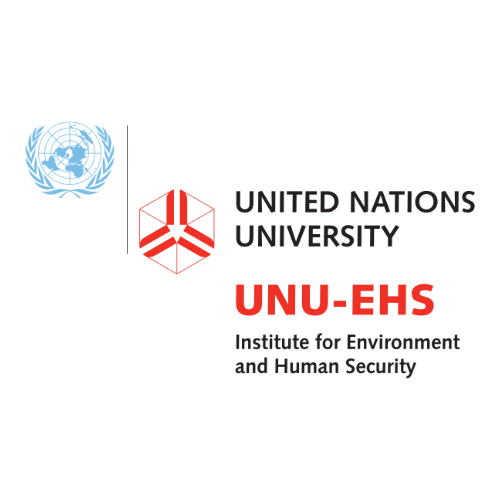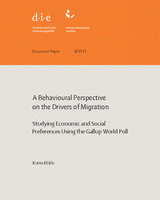News

From Managing Disasters To Managing Risks
How Can Risk Analytics Help Us Shift the Paradigm?
It is widely established that it makes sense to invest in risk prevention. Loss of life and economic damage can be prevented if disaster situations are avoided, or if their effects are reduced. However, it appears that societies at large are risk-takers, especially when it comes to rare and high-impact events. Risk management and prevention are often not a priority for us, neither at the individual level, nor for households, enterprises and governments. This is a problem especially for disadvantaged groups as their specific needs tend to be overlooked in disaster situations.

A behavioural perspective on the drivers of migration: studying economic and social preferences using the Gallup World Poll
This paper addresses the self-selection of potential migrants. In particular, the study examines whether risk and time preferences explain a significant proportion in the movement heterogeneity of individuals. It is further intended to shed light on the role of social preferences (trust, altruism, reciprocity) as potential migratory determinants. By making use of a unique cross-sectional data set on migration intentions (Gallup World Poll) and experimentally-validated preferences (the Global Preference Survey) covering 70 countries worldwide, a probit model is estimated.

Imme Scholz as an expert on sustainable development in the Citizens’ Council Germany
The second German Citizens’ Council was established at the beginning of 2021: from now on, 160 people will discuss the important questions of our time and formulate recommendations for action to German policymakers. The participants have been selected by draw and represent the diverse perspectives of German citizens within the Council. They address significant topics in their ten virtual sessions, such as the question of Germany’s role in securing international cohesion or the country’s performance in EU migration policy.

Master’s student researches human mobility and landslide risk perception in Brazil
The theme of this year’s International Migrants Day was re-imagining human mobility, and for Master’s of Geography of Environmental Risks and Human Security student Ronja Winkhardt-Enz, the theme directly relates to her master’s thesis research on human mobility and landslide risk perception in Brazil.

Happy Holidays and a Happy New Year!
At the end of this year we would like to pause for a moment, look back on this challenging and special year 2020.
We wish you happy holidays and a happy new year!

New YouTube Video
Have a look at our latest video explaining the Digitalization Sustainability Matrix!
The project “digitainable” investigates possible positive and negative impacts of the rapid progress in digitalization and artificial intelligence on sustainable development. […]

New InsuRisk report
On December 9, 2020 at the 4th InsuResilience Global Partnership Forum, UNU-EHS and the InsuResilience Secretariat launched their new report, Disaster Risk and Readiness for Insurance Solutions in Small Island Developing States (SIDS).
The InsuResilience Global Partnership is the world premier global coordination forum on disaster finance and climate risk insurance. The annual Partnership Forum acts as a convening space for decision makers, implementing organizations, private sector, academia and civil society to reflect, share and learn how societies can better prepare for future risks. […]

Climate Risk Insurance Initiative for the Pacific officially launched
Wednesday 2 December 2020 (Suva, Fiji) In a landmark event held today, the New Zealand High Commissioner to Fiji, H.E. Jonathan Curr launched the Leaving No One Behind in the Digital Era: Pacific Insurance and Climate Adaptation Programme. It is a first of its kind initiative for the region where market-based climate risk insurance solutions will be made available to Pacific islanders in Fiji and Vanuatu first, and then progressively to other Pacific island countries. The Programme, jointly developed and to be implemented by the United Nations Capital Development Fund (UNCDF), the United Nations University Institute for Environment and Human Security (UNU-EHS) and the United Nations Development Programme (UNDP), is financially supported by the New Zealand Aid Programme and the Australian Aid Programme. […]

Five things you need to know about health infrastructures
As the world battles the ongoing COVID-19 pandemic, it has become very clear that societies depend on functioning healthcare facilities. The sufficient availability of hospital beds, healthcare staff, protective gear or ventilators can make all the difference between a situation that is still manageable and a severe crisis. UNU-EHS Senior Scientist Dr. Simone Sandholz explains five important lessons on health infrastructure.